英语时态—一般将来时
英语时态之一般将来时(练习题及答案)

英语时态之一般将来时一、什么是时态时态就是表示一个动作发生的时间和所处的状态。
“时”就是这个动作发生的“时间”;“态”就是这个动作在某个时刻的“状态”。
二、时间的定义英语中把时间分为三类,即:过去现在将来三、状态的定义状态指的是在某个时刻这个动作所处于的状态。
动词共有四类状态,分别为:一般式、进行式、完成式和进行完成式。
1.一般式表示经常发生的动作,其动词形式为do例:I often get up at 7.我经常在七点钟起床。
2.进行式表示正在进行的动作,其动词形式为“be动词+ doing”例:She is singing a French song.她正在唱一首法语歌。
3.完成式表示对“之前发生动作”的一个总结,其动词形式为“have + done”例:They have found the missing child.他们找到那个失踪的孩子了。
4.完成进行式表示对“正在进行动作”的一个总结,其动词形式“have + been + doing”例:I have been reading books for two hours.我已经连续读书两个小时了。
四.一般将来时(will do):一般将来时表示某个将来的时间发生的动作或存在的状态。
1.在表示预测时,在一般将来时态中will和be going to的区别:(1).用be going to 特别指根据目前的明显迹象来推断某件事将要发生;而will则只是表明说话人认为或相信某件事将要发生。
(2).be going to 通常用来表示说话人预期所说的事件马上或在相当近的将来就要发生;而will 所表示的动作发生的时间可近可远。
2.在表示意愿时,在一般将来时态中will和be going to 的区别:(1)be going to 表示说话人对未来行动的计划或打算,通常是经过事先考虑并含有已经为这一行动做了某些准备的意思。
(2)will表示在说话的时刻立即做出决定将去做某事,事先并没有经过考虑,更没有为这一活动做出事先的准备。
英语时态一般将来时知识清单总结及用法

英语时态一般将来时知识清单总结及用法1、一般将来时的结构2、一般将来时的结构变化3、知识要点一般将来时的用法(1) 表示将来的动作或状态,常与tomorrow,this evening. next Monday (week,month,year,in ten minutes,someday,in 2018,in the future 等单词或短语连用。
如:They say that the weather will be good tomorrow. 据说明天是好天气。
I shall have supper soon. 我要吃晚饭了。
There will be a class meeting this afternoon. 今天下午开班会。
He will come to see you next Monday . 他下周一会来看你。
(2) 表示即将发生的或最近打算进行的事,常用“be going to+动词原形”。
如:How are you going to spend your holiday ? 你们打算怎样度假?(3) 表示按计划即将发生的动作,常用go,come,start,move,leave等动词的进行时态。
如:He is coming in a minute . 他很快就来。
(4) 表示按计划要发生的事或征求对方意见,或表示安排、命令、预定好要做的事情,常用“be to+动词原形”。
如:The concert is to take place on Friday evening . 音乐会要在下星期五举行。
(5)表示即将发生的动作,或者表示立刻要做的事情,近在眼前的将来,常用“be about to+动词原形”。
如:Hurry up! The train is about to leave . 快点!火车马上要开了○(6) 一般将来时中be going to结构与will的异同点:①be going to结构和will的相同点:都表示将来的动作或状态。
英语语法—一般将来时态
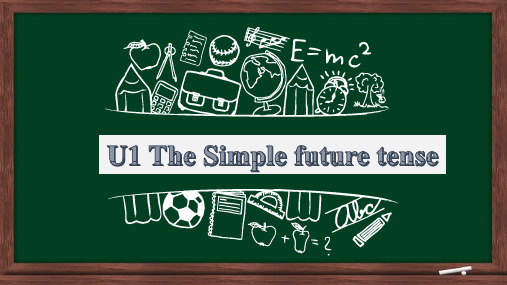
eg. My uncle is coming to see me tomorrow.
五、一般将来时特殊句式
1. There be 句式的一般将来时
Eg. There will be +其他 There is going to be+其他
2. 客观事实用一般现在
情态动词 (1)can/could:能够 could逾期 更委婉 (2)May/might 许可,准许 (3)Should 应该 主观义务
Have to 必须、不得不 (4)Must 主观必须,Must...?Yes,you must/no,you needn’t
Mustn’t 禁止 (5)Need 需要 Need...?Yes,you must/no,you needn’t
三、一般将来时 时间状语
Tomorrow、 Next week/month/year、 in+时间段、 this evening、 in the near future
四、一般将来时例句
1. 表示将来某个时间要发生的事 情或存在的状态。
eg.We will clean the room next week.
一、一般将来时用法(4)
1. 表示将来某个时间要发生的事 情或存在的状态。
3.条件、时间状语从句中,用一般 现在时表将来。
2. be going to 表示将要发生 或者打算、计划要做的事情,或者 可能发生的事情
4.go、come、leave、start等进行 时态表将来。
二、一般将来时结构 1. will / shall + 动词原形
Will / Shall +主语 + 动原 ?
小学英语动词时态——一般将来时

小学英语动词时态——一般将来时一般将来时的基本概念一般将来时表示将来某一时刻的动作或状态,或将来某一段时间内经常的动作或状态。
一般将来时由助动词shall(第一人称),will(第二、三人称)+动词原形构成。
美国英语则不管什么人称,一律用will。
一般将来时的形式●will 常简略为 'll,并与主语连写在一起,如:I'll,he'll,it'll,we'll,you'll,they'll。
●一般疑问句如用Will you…?其简略答语须是Yes,I will或 No,I will not;如用Shall you…?(较少见)其简略答语须是 Yes,I shall.或 No, I shall not.。
一般将来时的用法1)表示将来的动作或状态一般将来时常与一些表示将来的时间状语连用,如:tomorrow(明天), next week(下周), from now on(从现在开始);in the future(将来)等。
2)表示将来经常发生的动作。
一般将来时的其他用法一般将来时表示将来某一时刻的动作或状态,其表达形式除了“shall(第一人称),will (第二、三人称)+动词原形构成”外,还有以下几种形式。
1)“to be going to+动词原形”表示即将发生的或最近打算进行的事。
例如:①It is going to rain. 要下雨了。
②We are going to have a meeting today. 今天我们开会。
一般将来时特点1)shall用于第一人称,常被will 所代替。
will 在陈述句中用于各人称,在征求意见时常用于第二人称。
Which paragraph shall I read first?Will you be at home at seven this evening?2)be going to +不定式,表示将来。
英语时态—一般将来时

英语时态—一般将来时(The future indefinite tense)讲解与练习参考答案在英语中,每句话都包含一定的时态,要学好英语就必须掌握英语中一些常用的时态。
在英语中,不同时间发生的动作和情况,要用不同的动词形式表示.这种不同的时间和不同的动词形式就叫做动词的时态. 换句话说,判断一个句子的时态,可以通过句子中的时间和动词的形态来判断。
下面我就一般将来时作一些讲解,如有不妥之处,请指教。
每种时态都有三个最基本的要素,分别是该时态的概念、结构、判断标志词。
一、一般将来时的概念:一般将来时表示将来某一时刻的动作或状态,或将来某一段时间内经常的动作或状态。
二、一般将来时的结构:(有两类不同的结构)Ⅰ主语+shall(在英式英语中,只用于第一人称)/ will(在英式英语中,用于第二、三人称) +动词(原形)【美式英语则不管什么人称,一律用will,因此美式英语只有一种结构:主语+ will+动词(原形)】肯定句式:主语+ will + 动词(原形)+ 其它. 【主语+ will = 主语’ll】否定句式:主语+ will + not + 动词(原形)+ 其它. 【will not = won’t】一般疑问句:will + 主语+ 动词(原形)+ 其它?注:英式英语中现在也趋向于所有人称都用will,因此,现在比较少见到I shall或We shall Ⅱ主语+ be going to +动词(原形)+ 其它.肯定句式:主语+ be going to +动词(原形)+ 其它.否定句式:主语+ be + not + going to +动词(原形)+ 其它.一般疑问句:Be + 主语+ going to +动词(原形)+ 其它?注:主语+ be going to + 动词原形‖表示即将发生的或最近打算进行的事。
三、一般将来时的判断标志词tomorrow , the day after tomorrow , next + 时间,in + 一段时间, in + 将来的年代, at once , this afternoon , this evening , soon , in the future , some day , from now on , and so on.四、一般将来时的基本用法1. ①表示将来发生的行为或存在的状态,常与tomorrow; in 2020;next week(year ,month), from now on,soon, some day, the day aftertomorrow,in(the)future, in five days(再过五天), in two weeks(再过二星期)等表示将来的时间状语连用。
一般将来时态精讲
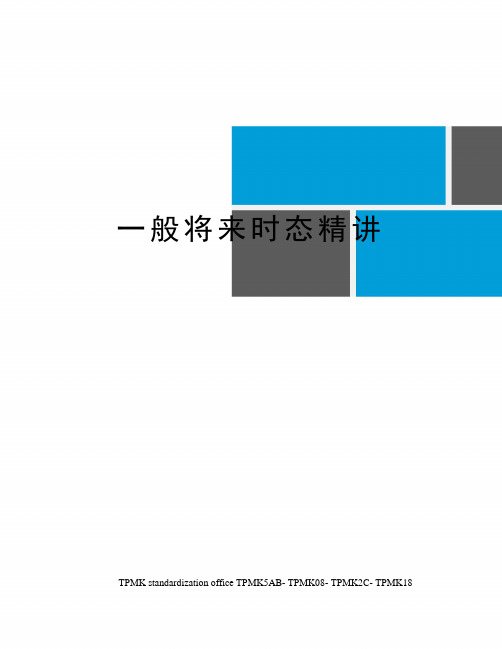
一般将来时态精讲TPMK standardization office TPMK5AB- TPMK08- TPMK2C- TPMK18一般将来时态精讲(一)一般将来时(de)定义一般将来时表示将来某个时间所发生动(de)作或存在(de)状态,也可表示将来经常或反复发生(de)动作,经常与表示将来(de)时间状语连用, 如:soon, tomorrow,next week, in a few days等.例如:Where will you be this time tomorrow 明天这个时候你会在那儿1. 表示将要发生(de)动作或存在(de)状态.例如:I will return the book in a few days. 我过几天会还这本书.2. 表示将来经常或反复发生(de)动作.例如:They will go to the park every Sunday. 他们将每周日去公园.(二)一般将来时(de)构成一般将来时由“助动词shall/will+动词原形”构成.系动词am, is, are都用动词原形be.1. shall用于第一人称后表示一般将来时,一般只限于肯定句和否定句中.shall通常用于第一人称后,由其构成(de)一般疑问句用来询问对方(de)意见,这时(de)shall不含将来含义,也不可被will替代.例如:There’s no one to answer the phone. What shall we do 没有人接,我们该怎么办2.美国英语中,不论什么人称和数,一律用“will+动词原形”.在口语中,will常缩写为’ll,与主语连写在一起.如:I’ll, you’ll, he’ll, she’ll, we’ll, they’ll;而shall not常缩写为shan’t,will not常缩写为won’t.(三)一般将来时(de)结构1. 肯定句:主语+shall\will+动词原形.I shall\will work next year. 明年我将要工作了.2. 否定句:主语+shall\ will+not+动词原形.I won’t tell anyone what you said. 你说(de)话我不会告诉任何人.3. 一般疑问句:Shall\Will+主语+动词原形—Will you leave for Beijing next week 下周你将前往北京吗—Yes, I will. 是(de),我将要去. No, I won’t. 不,我不去.4. 特殊疑问句“特殊疑问词+一般疑问句”(de)语序,也就是“疑问词+will+主语+动词原形+其他成分”.如果是对主语提问,则主语就不在句子中出现.例如:Who will leave for Beijing next week 下周谁将前往北京(四)There be 句型(de)一般将来时There be 句型(de)一般将来时There will be表示“将来有……”.1. 肯定句:There will be+ 物+ 介词短语+其他.例如:There will be cars in people’s home in the future..将来人们(de)家里会很多(de)小汽车.2. 否定句:There won’t be + 物+介词短语+ 其他.例如:There won’t be any trees in this place in two years.两年后这个地方就不会有树了.3. 疑问句:Will there be +物+介词短语+其他例如:—Will there be less pollution 将来会有更少(de)污染吗—Yes, there will.是(de),会(de).—No, there won’t. 不,不会.(五)be going to 表示将来1.用来表示按计划或安排要发生(de)动作We are going to have a class meeting this afternoon.今天下午我们打算开班会.2.表示推测将要或肯定会发生(de)动作,有“准备;打算”(de)意思.含有be going to 结构(de)句子中往往有表示将来(de)时间状语.例如:Look at the black clouds. It's going to rain.看那些乌云,快要下雨了.结构:肯定句:主语 + be(am,is,are) + going to do sth.否定句:主语 + be(am,is,are)+ not + going to do sth.疑问句:Be(am,is,are)+ 主语 + going to do sthYes, 主语+ am/is/are. / No, 主语+ isn't/aren't. / No, I'm not. They are going to see the car factory next week. (肯定句) They are not going to see the car factory next week. (否定句)-Are they going to see the car factory next week-Yes, they are. (No, they aren't.) (一般疑问句及其回答)注意:There is / are going to be... (注意句型中going to 后面(de)be不能改为have.) 常用来表示将有某事发生.例如:There is going to be a football match next Saturday in our school.下周六我们学校将有一场足球比赛.(六)come, go, leave, arrive,take等表示位置移动(de)动词常用现在进行时表示将要发生(de)动作,它们很少与be going to 结构连用.例如:Miss Sun is coming tonight.今晚孙小姐要来.(七)be going to 和will(de)区别1.will表示说话人认为、相信、希望或假定要发生(de)事,不含任何具体(de)时间,可以指遥远(de)将来;而be going to 指有迹象表明某事即将发生或肯定发生,通常指很快就要发生(de)事情.2. be gong to 和will均可表示意图,但事先考虑过(de)意图用be going to,不是事先考虑过(de)意图用will.一般将来时练习一、单项选择( ) 1. There __________ a meeting tomorrow afternoon.A. will be going toB. will going to beC. is going to beD. will go to be( ) 2. Charlie ________ here next month.A. isn’t workingB. doesn’t workingC. isn’t going toworking D. won’t work( ) 3. He ________ very busy this week, he ________ free next week.A. will be; isB. is; isC. will be; will beD. is;will be( ) 4. There ________ a dolphin show in the zoo tomorrow evening.A. wasB. is going to haveC. will haveD.is going to be( ) 5. –________ you ________ free tomorrow – No. I ________ free the day aftertomorrow.A. Are; going to; willB. Are; going to be; willC. Are; going to; will beD. Are; going to be; will be( ) 6. Mother ________ me a nice present on my next birthday.A. will givesB. will giveC. givesD.give( ) 7. – Shall I buy a cup of tea for you –________. (不,不要.)A. No, you won’t.B. No, you aren’t.C. No, please don’t.D. No, please.( ) 8. – Where is the morning paper – I ________ it for youat once.A. getB. am gettingC. to getD. will get ( ) 9. ________ a concert next SaturdayA. There will beB. Will there beC. There can beD. There are( ) 10. If they come, we ________ a meeting.A. haveB. will haveC. hadD. would have( ) 11. He ________ her a beautiful hat on her next birthday.A. givesB. gaveC. will givingD. isgoing to give( ) 12. He ________ to us as soon as he gets there.A. writesB. has writtenC. will writeD. wrote( ) 13. He ________ in three days.A. coming backB. came backC. will come backD. isgoing to coming back( ) 14. If it ________ tomorrow, we’ll go roller-skating.A. isn’t rainB. won’t rainC. doesn’t rainD. doesn’t fine( ) 15. – Will his parents go to see the Terra Cotta Warriorstomorrow– No, ________ (不去).A. they willn’t.B. they won’t.C. they aren’t.D. they don’t.( ) 16. Who ________ we ________ swimming with tomorrow afternoonA. will; goB. do; goC. will; goingD. shall;go( ) 17. We ________ the work this way next time.A. doB. will doC. going to doD. will doing( ) 18. Tomorrow he ________ a kite in the open air first, and then________ boating in thepark.A. will fly; will goB. will fly; goesC. is going to fly;will goes D. flies; will go( ) 19. The day after tomorrow they ________ a volleyball match.A. will watchingB. watchesC. is watchingD. is going to watch( ) 20. There ________ a birthday party this Sunday.A. shall beB. will beC. shall going to beD. will going to be( ) 21. They ________ an English evening next Sunday.A. are havingB. are going to haveC. will havingD. is going to have( ) 22. ________ you ________ free next SundayA. Will; areB. Will; beC. Do; beD. Are; be( ) 23. He ________ there at ten tomorrow morning.A. willB. isC. will beD. be( ) 24. ________ your brother ________ a magazine from the libraryA. Are; going to borrowB. Is; going to borrowC. Will; borrowsD. Are; going to borrows( ) 25. – Shall I come again tomorrow afternoon –________ (好(de)).A. Yes, pleaseB. Yes, you will.C. No, please.D. No, you won’t.( ) 26. It ________ the year of the horse next year.A. is going to beB. is going toC. will beD. will is( ) 27. ________ open the windowA. Will you pleaseB. Please will youC. You pleaseD. Do you( ) 28. –Let’s go out to play football, shall we – OK. I________.A. will comingB. be going to comeC. comeD. am coming( ) 29. It ________ us a long time to learn English well.A. takesB. will takeC. spendsD. will spend ( ) 30. The train ____ at 11.A. going to arriveB. will be arriveC. is going toD. is arriving二、动词填空1. I ______(leave)in a minute. I ______(finish)all my work before I ______ (leave).2. —How long _____ you _____(study)in our country—I _____(plan)to be here for about one more year.—I _____(hope)to visit the other parts of your country.—What ______ you ______(do)after you ______(leave)here—I ______(return)home and ______(get)a job.3. I ______(be)tired. I ___________(go)to bed early tonight.4. Mary’s birthday is next Monday, her mother __________(give)her a present.5. It is very cold these days. It ___________(snow)soon.6. —_____ you _____(be)here this Saturday —No. I ___________(visit)my teacher.7. —______ I ______(get)you a copy of today’s newspaper —Thank you.8. I am afraid there ______(be)a meeting this afternoon. I can’t join you.9. Mike ___________( not , believe)this until he ______(see)it with his own eyes.10. Most of us don’t think their team ______(win).三、句型转换.1. People in the north often go skating in winter. (next winter)________________________________________________________________________ ______2.There are two cinemas in that town. (next year)________________________________________________________________________ ______3.He comes back late.(in two days)________________________________________________________________________ ______4.She is a conductor of a train.(soon)________________________________________________________________________ ______5.Li Ming is ten years old.(next year)________________________________________________________________________ ______6.I sometimes write to my mother in the evening.(tonight)________________________________________________________________________ ______7.He went there by plane.(some day next year)________________________________________________________________________ ______8.China is a modern and strong country.(in twenty years)________________________________________________________________________ ______9.Do you study hard(from now on)________________________________________________________________________ ______10.She didn’t speak English at the meeting.(before long)________________________________________________________________________ ______。
英语语法:一般将来时解释集

英语语法:一般将来时解释大全一、基本定义一般将来时是英语时态的一种,表示将来的动作或状态。
它主要用于描述未来的计划、预测或期望发生的事情。
二、形式构成一般将来时的构成主要有以下几种形式:1. 基本结构:主语+ will /shall + 动词原形+ 其他成分。
这是最基本的一般将来时形式,表示将来的动作或状态。
2. be going to 结构:主语+ be(am, is, are)going to + 动词原形+ 其他成分。
这种结构表示计划或安排将要发生的事情,也可以表示根据目前的迹象或情况预测将会发生的事情。
3. be+动词不定式:主语+ be(am, is, are)to + 动词原形+ 其他成分。
这种结构表示计划或安排将来要做的事情。
4. be+动词ing:主语+ be(am, is, are)+ 动词ing形式+ 其他成分。
这种结构表示即将发生的动作,通常与“when”连用。
5. be+表示时间的介词短语:主语+ be(am, is, are)+ 表示时间的介词短语。
这种结构用于表示将来某个时间点的情况。
6. 将来时间状语:tomorrow, next week, in the future等以上就是一般将来时的主要构成形式。
需要注意的是,在具体使用时,应根据语境和上下文选择合适的构成方式。
三、用法场景1. 表达未来的计划或意图,例如:I will go to the beach next summer.2. 描述未来的预测或期望,例如:It will rain this afternoon.3. 在条件句中表示将来的结果,例如:If you study hard, you will pass the exam.四、与其他时态的区别1. 与现在进行时态的区别:现在进行时态强调正在进行的动作,而一般将来时态强调将来的动作或状态。
2. 与过去时态的区别:过去时态表示过去的动作或状态,与将来时间无关。
动词时态一般将来时的用法

动词时态一般将来时的用法动词时态包含了多种不同的形式,每种形式都传达了特定的时间信息。
在英语中,一般将来时是用来表达将来发生的动作、事件或状态的。
本文将详细介绍一般将来时的用法,并提供一些例句来帮助读者更好地理解。
一、一般将来时的定义一般将来时是用来表达明确的将来发生的动作或状态。
通常使用的助动词是will或shall,根据主语的不同而定。
二、一般将来时的构成1. 肯定句结构:主语 + will + 动词原形例如:- I will go shopping tomorrow.- He will travel to Europe next week.2. 否定句结构:主语 + will + not + 动词原形,或主语 + won't + 动词原形例如:- She will not visit her grandparents this weekend.- They won't attend the party.3. 疑问句结构:Will + 主语 + 动词原形?例如:- Will you join us for dinner?- Will they arrive on time?三、一般将来时的用法1. 表达自愿或意愿一般将来时常常用来表达主观上的决定、打算或愿望。
例如:- I will help you with your project.- He will volunteer at the local charity organization.2. 表示未来的计划或安排一般将来时可用于描述预定的时间表或安排。
例如:- We will have a meeting at 9am tomorrow.- They will arrive at the airport in the evening.3. 表示预测或推测有时,我们可以根据现有的证据或情况,使用一般将来时来推测未来可能发生的事情。
掌握时态一般将来时和过去将来时

掌握时态一般将来时和过去将来时一般将来时和过去将来时是英语中常用的两种时态形式,它们帮助我们描述将来发生的动作或事件,同时强调时间的关系。
在本文中,我们将重点探讨这两种时态的用法和相应的例句。
一、一般将来时(Simple Future Tense)一般将来时用来表达将来某个时间发生的动作或事件。
我们可以使用以下几种结构来构成一般将来时:1. 使用“will + 动词原形”构成句子,表示决定或预测的未来动作或事件。
例如:- I will visit my grandparents this weekend.(我会在这个周末去拜访我的祖父母。
)- He will be a doctor when he grows up.(他长大后会成为一名医生。
)2. 使用“be going to + 动词原形”表示计划、意愿或打算去做某事。
例如:- I am going to study abroad next year.(明年我打算出国留学。
)- She is going to have a party on Friday.(她打算在周五举办一个派对。
)3. 使用“shall + 动词原形”构成句子,表示“我将”,主要用于“我们”(“we”)和“我”(“I”)。
例如:- We shall meet at the park tomorrow.(明天我们将在公园见面。
)- Shall I help you with the bags?(我应该帮你拿行李吗?)二、过去将来时(Future in the Past Tense)过去将来时用于描述在过去某个时间点将来会发生的动作或事件。
我们可以使用以下结构来构成过去将来时:1. 使用“would + 动词原形”构成句子,表示过去某个时间点的将来动作。
例如:- He said he would come to the party.(他说他会来参加派对。
)- She told me she would give me a call later.(她告诉我她稍后会给我打电话。
英语一般将来时

英语一般将来时英语一般将来时,又称为未来时态,是用来表示将来会发生的动作、事件或状态的一种时态。
它的构成通常由"will" 或 "be going to" 加上动词原形来表示。
下面将详细介绍英语一般将来时的用法。
一、"will"的用法:1. 表示将来的决心、意图、打算或做出的决定。
例如:I will help you with your homework after dinner.(晚饭后我会帮你做作业。
)2. 表示对将来的预测、推测或猜测。
例如:It will rain tomorrow.(明天会下雨。
)3. 表示对将来的自然趋势、发展或趋势。
例如:Technology will continue to advance in the future.(科技将来会继续发展。
)4. 表示对将来的保证、允诺、请求或建议。
例如:I promise I will be on time for the meeting.(我保证会准时参加会议。
)二、"be going to"的用法:1. 表示对将来已经计划或决定好的事情。
例如:I am going to visit my grandparents this weekend.(这个周末我打算去看望我的祖父母。
)2. 表示对将来可能发生的事情有一种预见或判断。
例如:Look at those dark clouds. It's going to rain.(看那些乌云,将要下雨了。
)3. 表示以现有证据或迹象预测未来。
例如:She's been studying very hard. She's going to pass the exam.(她一直学得很努力,她一定会通过考试的。
)三、注意事项:1. 一般将来时中的时间状语词可以是今天、明天、以后、将来、下个月等表示将来的时间状语词。
英语时态:一般将来时

英语时态:一般将来时一般将来时(simple future tense)表示将来某一时段的动作或状态,或将来某一段时间内经常的动作或状态。
一般将来时常常和表示将来的时间状语连用。
如:tomorrow, next week, in the future, in a year等。
Ⅰ. 句法结构【仅讨论陈述句和疑问句两种语式】:1.陈述句:A. 肯定形式:主语+be going to /will/shall +动词原形+其他B. 否定形式:主语+be not going to /will not/shall not+动词原形+其他注:a. 在直接在助动词后加not。
b. be going to结构中的be仅指am, is, are三个be动词。
c. will/shall+动原结构在谓语两态变化中无人称和数的变化。
d. 一般情况下,仅表示时态时,shall用于第一人称,will用于第二、三人称;表示说话人强烈意愿和语气时则用法相反。
2.疑问句:A. 一般疑问句:助动词提前即可①Be动词+主语+ going to +动词原形+其他②Will/Shall+主语+动词原形+其他B.特殊疑问句:特殊疑问词+一般疑问句(同上)3.被动语态:主语+ 助动词(结构) + be +动词过去分词【被动结构be done,时体现在助动词】➢两态变化例句参考下表(以will为例):Ⅰ. 主要用法及结构:1.【一般将来时表将来】一般将来时表示将要发生的动作或情况。
A.will/shall +动原I will(shall) arrive tomorrow.Will you be free tonight?B.be going to+动原a.表示计划、打算、准备做的事。
We are going to put up a building here.b.表示即将发生或肯定要发生的事。
I think it is going to snow.注:在一般将来时的句子中,有时有表示将来时间的状语,有时没有时间状语,这时要从意思上判断是否指未来的动作或情况。
英语四种时态总结
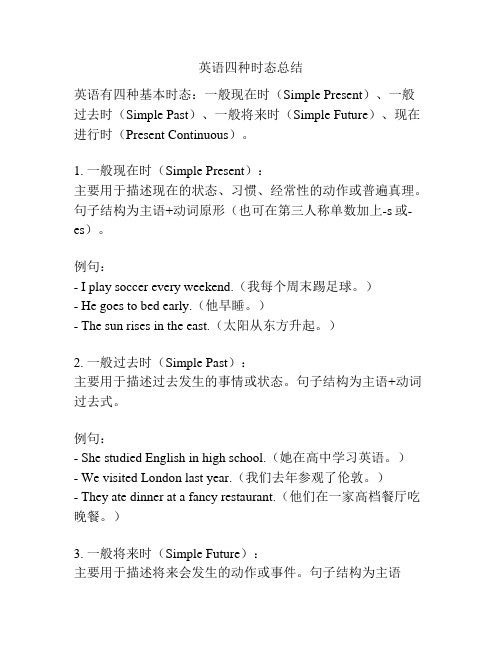
英语四种时态总结英语有四种基本时态:一般现在时(Simple Present)、一般过去时(Simple Past)、一般将来时(Simple Future)、现在进行时(Present Continuous)。
1. 一般现在时(Simple Present):主要用于描述现在的状态、习惯、经常性的动作或普遍真理。
句子结构为主语+动词原形(也可在第三人称单数加上-s或-es)。
例句:- I play soccer every weekend.(我每个周末踢足球。
)- He goes to bed early.(他早睡。
)- The sun rises in the east.(太阳从东方升起。
)2. 一般过去时(Simple Past):主要用于描述过去发生的事情或状态。
句子结构为主语+动词过去式。
例句:- She studied English in high school.(她在高中学习英语。
)- We visited London last year.(我们去年参观了伦敦。
)- They ate dinner at a fancy restaurant.(他们在一家高档餐厅吃晚餐。
)3. 一般将来时(Simple Future):主要用于描述将来会发生的动作或事件。
句子结构为主语+will+动词原形。
例句:- I will go to the gym tomorrow.(我明天会去健身房。
)- She will take the exam next week.(她下周会参加考试。
)- We will have a party on Friday.(我们星期五会举办一场派对。
)4. 现在进行时(Present Continuous):主要用于描述当前正在进行的动作。
句子结构为主语+be动词(am/is/are)+动词的ing形式。
例句:- They are watching a movie now.(他们正在看电影。
英语三大一般时态之三——将来时

一般将来时英语三大一般时态之三: 一般将来时一、构成一、构成等时间状语连用。
一般将来时表示将来发生的事。
常与tomorrow, next year等时间状语连用。
二、用法二、用法通常有以下七种方式表示将来,注意它们各自的区别。
1、由will 加动词原形构成,当主语是第一人称时,也可以用shall 加动词原形。
如:Telephone me this evening. I’ll be at home. 今晚给我打电话,我会在家。
今晚给我打电话,我会在家。
I’ll (shall/will) do a better job next time. 下次我要干得好些。
下次我要干得好些。
注意:注意:1)will还可用来表示同意或“不能”。
如:Come and see me tomorrow. Yes,I will. 明天来找我。
——好的。
好的。
不会晚的。
一Don’t be late. 一No,I won’t. 别来晚了。
——不会晚的。
The car won’t start. 车开不了啦。
车开不了啦。
Oil and water will not mix. 油和水没法混在一起。
油和水没法混在一起。
2)在“祈使句+and/or+陈述句”句型中,陈述句中只能用will或情态动词加动词原形。
如:Work hard, and you will pass the exam. 努力学习,你就会通过考试。
努力学习,你就会通过考试。
3)在条件句中表示将来不用will,而用一般现在时、be going to(打算) 或be to(为人所控制的动作) 等。
若你见到在条件句中用了will,那will 就是表示“愿意”的情态动词。
如:Let her do that if she will. 如果她愿意,就让她那样做。
如果她愿意,就让她那样做。
2、be going to 加动词原形,表示主语的意图或打算将来做的事。
如:加动词原形,表示主语的意图或打算将来做的事。
英语一般将来时笔记整理

英语一般将来时笔记整理一般将来时(Simple Future Tense)是英语中用来表示将来发生的动作、事件或情况的时态。
它可以用于陈述事实、预测未来和表达意图。
一般将来时的构成形式为:will/shall + 动词原形。
例如:1. I will go to the park tomorrow.(我明天会去公园。
)2. She will study abroad next year.(她明年会出国留学。
)3. They will have a meeting in the afternoon.(他们下午会开会。
)一般将来时还可以使用be going to + 动词原形来表达将来的打算、决定或意图。
例如:1. I am going to visit my grandparents this weekend.(我这个周末打算去看望我的祖父母。
)2. He is going to buy a new car next month.(他下个月打算买辆新车。
)3. They are going to have a party to celebrate their anniversary.(他们打算举办一个派对来庆祝他们的周年纪念。
)一般将来时也可以用于表达预测、猜测或推测未来的情况。
例如:1. It will rain tomorrow.(明天会下雨。
)2. They will probably win the game.(他们有可能会赢得比赛。
)3. She won't pass the exam.(她不会通过考试。
)需要注意的是,一般将来时通常不能与表示将来时间的副词或短语连用,因为将来时本身已经表达了将来的含义。
总结起来,一般将来时是用来表示将来发生的动作、事件或情况的时态,可以用于陈述事实、预测未来和表达意图。
它的构成形式为will/shall + 动词原形,也可以使用be going to + 动词原形来表达将来的打算、决定或意图。
中考英语时态之一般将来时

A. receives B. received C. will receive
2. I__C___ a movie with you if I____free tomorrow. if当“如果”
A. see;am B. see;will be C.will see;am
讲,遵循
3. We__A__a party for Jenny. It's supposed to be a
Eg: I won't go abroad next month. ②be+not+going to+v.原
Eg: I am not going to have a party tomorrow.
一般疑问句:①will提前于句首; Eg: I will go abroad next month.--Will you
I'm coming. 3. 一般现在时表将来 1)严格按照原定计划、时刻表将要发生的事情 Eg: We have no classes tomorrow. 2)在时间状语或条件状语从句中,用一般现在时表将来(从句) Eg: I will call you as soon as I get home.
surprise.
根据语境可知将为她举办聚会
主将从现 原则
A. will have B. have C. had
ቤተ መጻሕፍቲ ባይዱ
其他表达法: 1.be going to+v.原表将来 Eg: I'm going to buy a car.(打算做)
It's going to rain soon. (根据迹象推断出来) 2.现在进行时表将来,常见词有go,come,leave,等 Eg: I'm leaving for Beijing.
英语语法一般将来时讲解
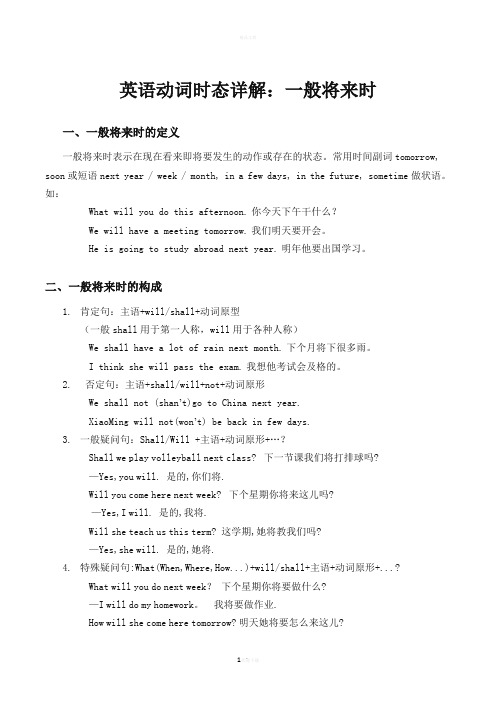
英语动词时态详解:一般将来时一、一般将来时的定义一般将来时表示在现在看来即将要发生的动作或存在的状态。
常用时间副词tomorrow, soon或短语next year / week / month, in a few days, in the future, sometime做状语。
如:What will you do this afternoon.你今天下午干什么?We will have a meeting tomorrow.我们明天要开会。
He is going to study abroad next year.明年他要出国学习。
二、一般将来时的构成1.肯定句:主语+will/shall+动词原型(一般shall用于第一人称,will用于各种人称)We shall have a lot of rain next month.下个月将下很多雨。
I think she will pass the exam.我想他考试会及格的。
2.否定句:主语+shall/will+not+动词原形We shall not (shan’t)go to China next year.XiaoMing will not(won’t) be back in few days.3.一般疑问句:Shall/Will +主语+动词原形+…?Shall we play volleyball next class?下一节课我们将打排球吗?—Yes,you will.是的,你们将.Will you come here next week?下个星期你将来这儿吗?—Yes,I will.是的,我将.Will she teach us this term?这学期,她将教我们吗?—Yes,she will.是的,她将.4.特殊疑问句:What(When,Where,How...)+will/shall+主语+动词原形+...?What will you do next week?下个星期你将要做什么?—I will do my homework。
小学英语一般将来时
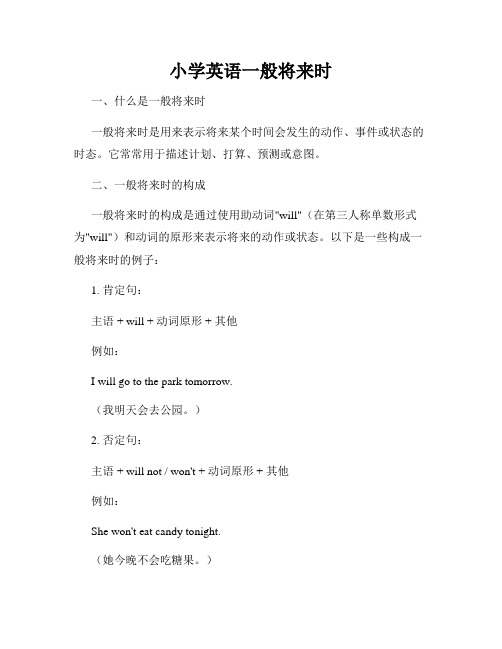
小学英语一般将来时一、什么是一般将来时一般将来时是用来表示将来某个时间会发生的动作、事件或状态的时态。
它常常用于描述计划、打算、预测或意图。
二、一般将来时的构成一般将来时的构成是通过使用助动词"will"(在第三人称单数形式为"will")和动词的原形来表示将来的动作或状态。
以下是一些构成一般将来时的例子:1. 肯定句:主语 + will + 动词原形 + 其他例如:I will go to the park tomorrow.(我明天会去公园。
)2. 否定句:主语 + will not / won't + 动词原形 + 其他例如:She won't eat candy tonight.(她今晚不会吃糖果。
)3. 疑问句:Will + 主语 + 动词原形 + 其他?例如:Will they come to the party?(他们会来参加派对吗?)三、一般将来时的使用场景下面是一些小学英语中常见的使用一般将来时的场景:1. 表示计划或打算:I will visit my grandparents next month.(我下个月会去拜访我的祖父母。
)2. 表示预测或推测:It will rain tomorrow.(明天会下雨。
)3. 表示意愿或承诺:I will help you with your homework.(我会帮你做作业。
)4. 表示未来常态:The school will start at 8:00 AM tomorrow.(明天学校将会在早上8点开始。
)5. 表示请求、命令或建议:Will you please pass me the book?(你能给我递一下那本书吗?)四、注意事项1. "will"后面的动词使用原形形式。
2. 助动词"will"可以缩写成"’ll"。
小学英语语法详解时态--一般将来时(1)(2)

小学英语语法详解时态——一般将来时(1)什么是一般将来时?一般将来时表示将来某一时刻的动作或状态,或将来某段时间内经常的动作或状态。
常用的基本形式有三种:will/shall结构;be going to结构;be about to结构一.will/shall 结构1.基本结构:主语+will/shall+ 动词原形表示将来发生的事情或是主语将要发生的行为,也用于征求对方的意见或表示客气的邀请。
It will be sunny tomorrow.明天将是个好天气。
(表示将来发生的状况)I will come back soon.我很快就回来。
(表示主语将要发生的行为)Will you please open the window?请你把窗打开,好吗?(表示征求对方的意见)Linda老师的小提醒★一般将来时任何主语都可以用will但书面语中第一人称常用shall。
I shall study harder at English.我将更加努力地学习英语。
Shall we go to see a film?我们去看电影好吗?★will,shall和主语都可以缩写成’llI’ll fly to London.我要坐飞机去伦敦。
They’ll visit the museum tomorrow.他们明天要参观博物馆。
2. 一般疑问句:将will/shall提到句首Will you go there?你要去那儿吗?3.否定句:在will/shall后加not,可缩写成won't/shan't陈述句:I will go there./I shall go there.我要去那儿。
否定句:I won't go there. /I shan't go there.我不去那儿。
4. 特殊疑问句:特殊疑问词+ will/shall +主语+动词原形+其他?What will he do this evening?今晚他准备做什么?(针对动词提问)When will you visit him?你什么时候去拜访他?(针对时间提问)Where will they have a running race?他们准备在哪里赛跑?(针对地点提问)小学英语语法详解时态——一般将来时(2)什么是一般将来时?一般将来时表示将来某一时刻的动作或状态,或将来某段时间内经常的动作或状态。
- 1、下载文档前请自行甄别文档内容的完整性,平台不提供额外的编辑、内容补充、找答案等附加服务。
- 2、"仅部分预览"的文档,不可在线预览部分如存在完整性等问题,可反馈申请退款(可完整预览的文档不适用该条件!)。
- 3、如文档侵犯您的权益,请联系客服反馈,我们会尽快为您处理(人工客服工作时间:9:00-18:30)。
英语时态—一般将来时(The future indefinite tense)讲解与练习参考答案在英语中,每句话都包含一定的时态,要学好英语就必须掌握英语中一些常用的时态。
在英语中,不同时间发生的动作和情况,要用不同的动词形式表示.这种不同的时间和不同的动词形式就叫做动词的时态. 换句话说,判断一个句子的时态,可以通过句子中的时间和动词的形态来判断。
下面我就一般将来时作一些讲解,如有不妥之处,请指教。
每种时态都有三个最基本的要素,分别是该时态的概念、结构、判断标志词。
一、一般将来时的概念:一般将来时表示将来某一时刻的动作或状态,或将来某一段时间内经常的动作或状态。
二、一般将来时的结构:(有两类不同的结构)Ⅰ主语+shall(在英式英语中,只用于第一人称)/ will(在英式英语中,用于第二、三人称)+动词(原形)【美式英语则不管什么人称,一律用will,因此美式英语只有一种结构:主语+ will+动词(原形)】肯定句式:主语+ will + 动词(原形)+ 其它. 【主语+ will = 主语’ll】否定句式:主语+ will + not + 动词(原形)+ 其它. 【will not = won’t】一般疑问句:will + 主语+ 动词(原形)+ 其它?注:英式英语中现在也趋向于所有人称都用will,因此,现在比较少见到I shall或We shall Ⅱ主语+ be going to +动词(原形)+ 其它.肯定句式:主语+ be going to +动词(原形)+ 其它.否定句式:主语+ be + not + going to +动词(原形)+ 其它.一般疑问句:Be + 主语+ going to +动词(原形)+ 其它?注:主语+ be going to + 动词原形‖表示即将发生的或最近打算进行的事。
三、一般将来时的判断标志词tomorrow , the day after tomorrow , next + 时间,in + 一段时间, in + 将来的年代, at once , this afternoon , this evening , soon , in the future , some day , from now on , and so on.四、一般将来时的基本用法1. ①表示将来发生的行为或存在的状态,常与tomorrow; in 2020;next week(year ,month), from now on,soon, some day, the day after tomorrow,in(the)future, in five days(再过五天),in two weeks(再过二星期)等表示将来的时间状语连用。
Will you be free tonight? 你今晚有空吗?He will arrive here tomorrow morning. 他将于明天早上到达这里。
Don’t worry. I will be back in three days.别担心,我三天之后就回来了②在时间状语和条件状语从句中,表示将来的时候,主句用一般将来时,从句用一般现在时:When it gets warmer the snow will start to melt.当气候变暖时,雪将开始融化。
I will go swimming if it doesn’t rain tomorrow. 如果明天不下雨,我将去游泳。
2. 表示将来的常见方法1)be going to +不定式,表示将来。
①与人连用时往往有―意图、意向、打算、目的在于……‖等含义We are not going to have a picnic. 我们不打算去野炊。
Are you going to buy him a gift? 你打算给他买礼物吗?②根据客观的迹象预示着…I’m going to leave at the end of this week. 我打算在这周末离开。
Look at the clouds, --- there is going to be a storm.看那天上的云,怕是要下雨了。
▲ be going to与will有如下几点区别:①be going to 表示近期、眼下就要发生的事情,will 表示的将来时间则可近可远,如:She told him she was going to quit the job.她告诉他,她即将辞职不干。
He will write a book one day.②be going to 表示根据主观判断将来肯定发生的事情,will表示客观上将来势必发生的事情。
He is seriously ill. He is going to die. 他病得很重。
他就快死了。
Tomorrow will be Wednesday. 明天是星期三。
③be going to 含有―计划,准备‖的意思,而will 则没有这个意思,如:She is going to lend us her book. 他准备把书借给我们。
He will be here in half an hour. 半小时后他将在这里。
④表达意图时:be going to do事先经过考虑的,而will do说话时刻临时想到的;表达预见时:be going to do有客观迹象作基础,而will do说话人的主观想法We’re really lost. I’ll stop and ask someone the way. 我们真的迷路了,我要停下来问路。
I will try my best to help her. 我愿尽力帮助她。
五、一般将来时的特殊用法1)go, come, start, move, sail, leave, arrive, stay、fly等可用进行时态表示将来,常有―意图‖、―安排‖或―打算‖的含义。
它常表示最近或较近的将来,所使用的动词多与移动、方向、启动等有关。
如:They are coming here this afternoon. 他们今天下午来这儿。
Mr. White is leaving for Beijing tomorrow.怀特先生明天将去北京。
▲ 也可用于某些非转移动词。
如:What are you doing next Sunday? 下星期天你打算干什么?My mother is buying me a bike soon. 我妈妈不久将给我买一辆自行车。
I’m meeting you after class. 课后我要找你。
2)come, go, leave, arrive, start, get, stay等动词用一般现在时也可表示将来。
Because the shop is closing down , all the T-shirts are sold at half price. 因为商店就要倒闭了,所有的T恤衫都半价出售The meeting starts at five o'clock. He gets off at the next stop.六、习题操练一、单项选择。
( ) 1. There __________ a meeting tomorrow afternoon.A. will be going toB. will going to beC. is going to beD. will go to be( ) 2. Charlie ________ here next month.A. isn’t workingB. doesn’t workingC. isn’t going to workingD. won’t work( ) 3. He ________ very busy this week, he ________ free next week.A. will be; isB. is; isC. will be; will beD. is; will be( ) 4. There ________ a dolphin show in the zoo tomorrow evening.A. wasB. is going to haveC. will haveD. is going to be( ) 5. –________ you ________ free tomorrow?– No. I ________ free the day after tomorrow.A. Are; going to; willB. Are; going to be; willC. Are; going to; will beD. Are; going to be; will be( ) 6. Mother ________ me a nice present on my next birthday.A. will givesB. will giveC. givesD. give( ) 7. – Shall I buy a cup of tea for you?–________. (不,不要。
)A. No, you won’t.B. No, you aren’t.C. No, please don’t.D. No, please.( ) 8. – Where is the morning paper?– I ________ if for you at once.A. getB. am gettingC. to getD. will get( ) 9. ________ a concert next Saturday?A. There will beB. Will there beC. There can beD. There are( ) 10. If they come, we ________ a meeting.A. haveB. will haveC. hadD. would have( ) 11. He ________ her a beautiful hat on her next birthday.A. givesB. gaveC. will givingD. is going to giving( ) 12. He ________ to us as soon as he gets there.A. writesB. has writtenC. will writeD. wrote( ) 13. He ________ in three days.A. coming backB. came backC. will come backD. is going to coming back( ) 14. If it ________ tomorrow, we’ll go roller-skating.A. isn’t rainB. won’t rainC. doesn’t rainD. doesn’t fine( ) 15. – Will his parents go to see the Terra Cotta Warriors tomorrow?– No, ________ (不去).A. they willn’t.B. they won’t.C. they aren’t.D. they don’t.( ) 16. Who ________ we ________ swimming with tomorrow afternoon?A. will; goB. do; goC. will; goingD. shall; go( ) 17. We ________ the work this way next time.A. doB. will doC. going to doD. will doing( ) 18. Tomorrow he _____ a kite in the open air first, and then ______ boating in the park.A. will fly; will goB. will fly; goesC. is going to fly; will goesD. flies; will go( ) 19. The day after tomorrow they ________ a volleyball match.A. will watchingB. watchesC. is watchingD. is going to watch( ) 20. There ________ a birthday party this Sunday.A. shall beB. will beC. shall going to beD. will going to be( ) 21. They ________ an English evening next Sunday.A. are havingB. are going to haveC. will havingD. is going to have( ) 22. ________ you ________ free next Sunday?A. Will; areB. Will; beC. Do; beD. Are; be( ) 23. He ________ there at ten tomorrow morning.A. willB. isC. will beD. be( ) 24. ________ your brother ________ a magazine from the library?A. Are; going to borrowB. Is; going to borrowC. Will; borrowsD. Are; going to borrows( ) 25. – Shall I come again tomorrow afternoon?–________ (好的).A. Y es, pleaseB. Y es, you will.C. No, please.D. No, you won’t.( ) 26. It ________ the year of the horse next year.A. is going to beB. is going toC. will beD. will is( ) 27. ________ open the window?A. Will you pleaseB. Please will youC. Y ou pleaseD. Do you ( ) 28. –Let’s go out to play football, shall we?– OK. I ________.A. will comingB. be going to comeC. comeD. am coming ( ) 29. It ________ us a long time to learn English well.A. takesB. will takeC. spendsD. will spend( ) 30. The train ________ at 11.A. going to arriveB. will be arriveC. is going toD. is arriving( ) 31. There __________ a meeting tomorrow afternoon.A. will be going toB. will going to beC. is going to beD. will go to be( ) 32. Charlie ________ here next month.A. isn’t workingB. doesn’t workingC. isn’t going to workingD. won’t work( ) 33. He ________ very busy this week, he ________ free next week.A. will be; isB. is; isC. will be; will beD. is; will be( ) 34. There ________ a dolphin show in the zoo tomorrow evening.A. wasB. is going to haveC. will haveD. is going to be( ) 35. –________ you ________ free tomorrow?– No. I ________ free the day after tomorrow.A. Are; going to; willB. Are; going to be; willC. Are; going to; will beD. Are; going to be; will be( ) 36. Mother ________ me a nice present on my next birthday.A. will givesB. will giveC. givesD. give( ) 37. – Shall I buy a cup of tea for you?–________. (不,不要。
